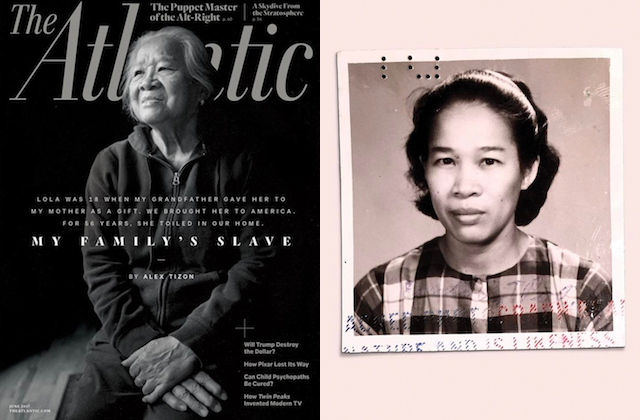"My Family’s Slave" lit up the internet mere minutes after The Atlantic published the article to its website on Tuesday (May 16). Responses to the magazine’s June 2017 cover story and its Pulitzer-winning author, Alex Tizon (who editors note died suddenly in March), ranged from effusive praise of its candor to disgust at its core narrative: Tizon’s admission that his grandfather and parents enslaved Eudocia Tomas Pulido, a Filipina woman who raised him and his siblings, for nearly six decades.
Tizon shares several intertwining aspects of her family’s relationship with Pulido, including his parents’ physical and emotional abuse towards her, the history of forced servitude in the Philippines through U.S. and Spanish colonization, and how she came to live with him after Tizon’s mother died. He mixes this with an account of taking "Lola’s" (an honorific title that translates from Tagalog to "grandma") ashes to her former village.
As the story continues making rounds, we share three reactions to "My Family’s Slave":
Filipino-American Historian Vicente Rafael:
The Seattle Times’ Susan Kelleher’s essay on her 2011 obituary for Pulido:
"Tizon and I talked for at least 90 minutes as I collected details for the story. He told me how Ms. Pulido was ‘asked’ to care for a young girl whose mother had died. How a relative requested that she ‘always look after the girl.’ How she followed that girl into adulthood and took care of her children, and the children’s children. She shopped, she ran off troublesome boyfriends, and, having had no romance of her own, was obsessed with the royal wedding of Princess Diana.
"In the more honest account Tizon wrote in The Atlantic, he admits that she was, in fact, a slave in their home. In Tizon’s written account, Ms. Pulido wasn’t ‘asked’ to care for his mother. She was ‘given’ to her. And everything that happened to Ms. Pulido from that day forward is tied to that act of inhumanity. …
"Obituaries depend on the fundamental honesty of the people who survive to tell the story. Tizon lied to me, and through me, to our readers, depriving Ms. Pulido of the truth of her life, and the rest of us an important piece of our history. And for that I am truly sorry."
Filipina journalist Lian Buan’s editorial for Rappler:
"I struggled to write this because it feels [like] betraying my own: Tizon is a Filipino, a journalist and an immigrant. I should be empathetic.
"But I’m choosing to take a hard look at the mirror and recognize that this is my problem too, that this is our problem too.
"Have we treated our house helps in the most humane way we can? Are we paying them the minimum wage? Are we giving them statutory benefits? Are we allowing them eight hours off daily, two days off weekly? All of which, by the way, are provided for in the Kasambahay Law.
"This is the conversation now, the conversation that ‘The Atlantic’ evaded when they decided they were going to go for a beautiful memoir, instead of a hard-hitting piece. …
"Lola is home, so it’s now up to us to continue the conversation. To stop would be to betray her memory, and maybe even Tizon’s."
